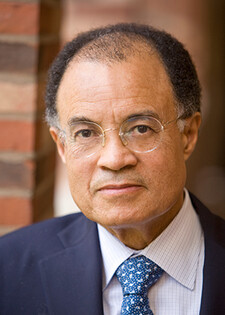Schell Center Remembers Founder Drew Days III
Drew Days III ’66 LL.B., the Alfred M. Rankin Professor of Law, who founded the Schell Center for International Human Rights in 1989, passed away in November4. Days’ commitment to human rights and his vision for the Schell Center continue to shape the human rights program at Yale Law School.

Days returned to Yale Law School, his alma mater, to teach in the early 1980s. At Yale, he taught and sponsored the first courses on international human rights law and worked with a group of students who started the Allard K. Lowenstein Human Rights Project in 1981; the Lowenstein Project, from which the Lowenstein International Human Rights Clinic evolved in 1989, continues as a student research and advocacy organization. “Drew drafted the Schell Center’s first mission statement, helped raise its endowment funding, and kickstarted its scholarly mission to make Yale Law School the world’s leading academic center for the study and practice of international human rights law,” Koh said.
“I was fortunate to have several teachers in law school who became lifelong mentors. Drew was one of them,” said Jim Silk ’89, the Binger Clinical Professor of Human Rights and current Co-Director of the Schell Center. “When he was negotiating the original Schell Center funding, I was in my third year of law school, and he consulted with a small group of us who were active in the Lowenstein Project about what the Schell Center’s mission should be. It’s been the great honor of my life to inherit the responsibility of fostering that mission and to sustain the program that Drew started and Harold Koh continued to build.”
After more than a decade leading the Schell Center, Days passed the responsibility to Koh when he took leave to become Solicitor General in the Clinton Administration. As the U.S. Government’s lead courtroom lawyer, Days, with characteristic courage, strongly supported the human rights accountability of Bosnian Serb war criminal Radovan Karadzic before U.S. courts. Karadzic was eventually tried and convicted by the International Criminal Tribunal for the former Yugoslavia.
“Drew was a kind and gentle person who provided a strong moral compass for all of us who studied with, worked with, or met him,” remembered Ron Slye ’89, Professor of Law at Seattle University and former Associate Director of the Schell Center. “It is a testament to his legacy and impact that he continues to live on within the thousands of us he influenced. I will always remember his infectious smile and laugh, both of which we could use more of these days.”
Following his government service, Days continued, in myriad quiet ways, to support international human rights around the world as a member of the board of the MacArthur Foundation. Days always spoke quietly, but sang with shimmering clarity, as a lifetime lead tenor for the Yale Russian Chorus. “His was always a voice for reason guided by compassion, principle over politics,” Koh reflected. “His voice and message should and will always be that of the Schell Center that he founded.”
“What I’ll miss most about Drew,” Silk added, “is the humility and integrity with which he lived his life and the way he greeted me — every time I saw him in the 20 years since I started teaching — with a warm smile and the greeting, ‘Hello, James,’ spoken in a joyful up-down-up lilt that lifted my spirits many times.”


